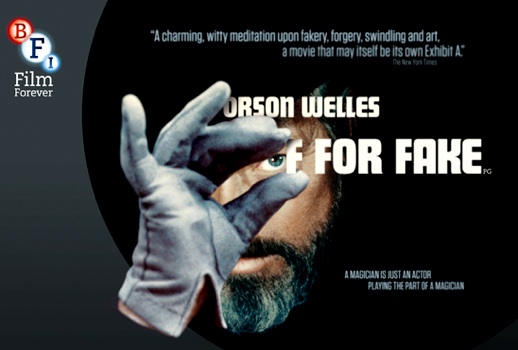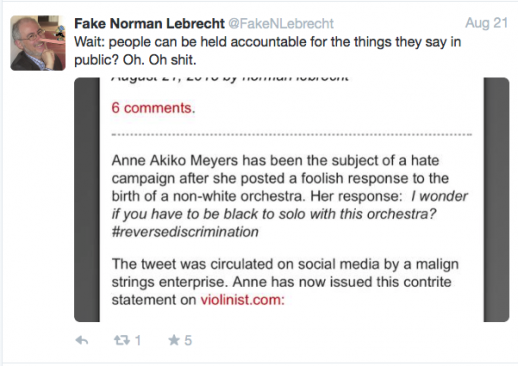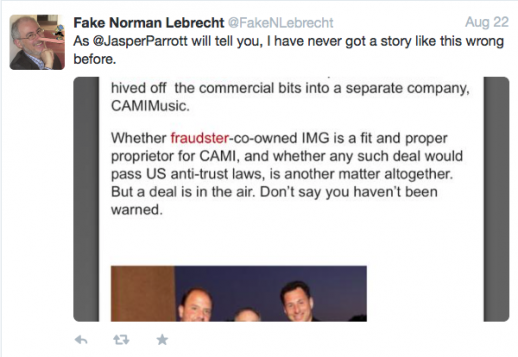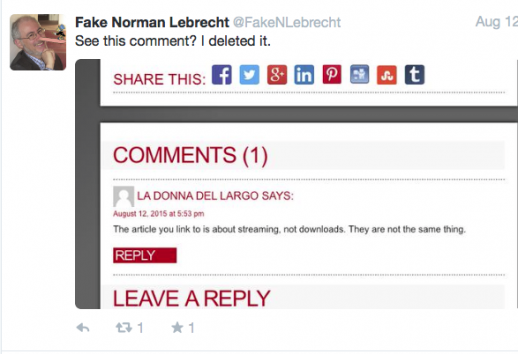
It should be stressed that this interview is not with the Real Norman Lebrecht, esteemed author of such tomes as Maestros, Masterpieces & Madness: The Secret Life and Shameful Death of the Classical Record Industry, but rather the Fake Norman Lebrecht, or, as we have noted before, @FakeNLebrecht.
Trigger warnings: Peter Gelb, libel law, missing luggage and Yuja Wang’s skimpies
La Cieca: Good afternoon, @FakeNLebrecht. Do help yourself to sco.nes and Earl Grey. I believe you have described Slipped Disc as “the world’s most read cultural website.” Won’t you let us in on the secret of your success?
@FakeNLebrecht: A few esoteric bloggers have suggested that I trade in sensationalist exaggerations, unchecked facts and deliberate distortions to create a relentless stream of shameless clickbait, but truthfully the secret to my success is in not regarding Sinfini or Classicalite as cultural websites.
LC: So does blogging represent the future of classical music journalism?
@FNL: Absolutely. I’ve been way ahead of the curve on this one. Newspapers are firing their critics all over the place. I should know, as I was one of the first to get fired. Today, classical music journalism is a completely unsustainable career, because editors think nobody is interested in classical music. Meanwhile I’ve built a career writing that nobody is interested in classical music.
LC: Do you feel any sense of responsibility there?
@FNL: No.
LC: Would you care to elaborate on that?
@FNL: No.
LC: I blush to admit that parterre.com is poised to make its multibilliondollar IPO any day now. You broke away from Artsjournal to run your blog independently. Has it become a lucrative business?
@FNL: Absolutely. I make as much as £5 in ad revenue from each post.
LC: Is that a lot?
@FNL: You wouldn’t think this from reading them, but my posts don’t take a lot of work. It adds up. I make about as much as an usher at a big concert hall.
LC: Color me pea green with envy! You initially carried advertising from arts organisations, but you now focus on Google Ads. Is there a story there?
@FNL: We have a number of attractive story packages on offer. It turns out, though, that there is no potential advertiser I haven’t offended.
LC: You certainly do seem to get a lot of exclusives. Can you share any tips?
@FNL: Get ahead of the story by writing about things that haven’t happened yet. Obituaries for living people are always a safe bet. They’ll die eventually, and then you can say you had it first. Also look for things nobody else will cover. If you’re the only person who reads a press release, it’s an exclusive. Ditto for anything you steal off Facebook. Finders keepers.
LC: You often talk about Slipped Disc’s “correspondents” and make liberal use of the editorial “we”. Do you employ a large team?
@FNL: There may be some lexical confusion here. The word “correspondent” can mean “paid reporter” but it can also mean “person who sent you an email” or “the person sitting next to you during a libel trial.” In the case of my website, it often means all three.

@FNL: That was just unlucky. It turns out I chose the only four evil things Klaus Heymann hasn’t done. If I’d stuck to “ritual slaughter of infants” and “plotting to introduce the world to morris dancing” it would have been fine.
LC: Has it changed the way you write?
@FNL: It has been observed that the passive voice is used with some regularity on my website. It’s just good craftsmanship really: readers are left wanting more. They want details: you don’t give them any—especially when the story concerns a notoriously egocentric and litigious multimillionaire.
LC: Now, moving on to lighter matters, how about the death of classical music? You’ve been predicting this for decades.
@FNL: I will keep predicting it until it happens.
LC: Another cucumber sandwich? You’ve said before that the role of the journalist is to “speak truth to power.” Is that still the case?
@FNL: Absolutely. Especially if you define “truth” as “ill-founded rumour” and “power” as “vague entity with no power to respond”.
LC: Like what?

LC: Regular readers will notice that both the age and nationality of performers are prominently represented in your coverage. Do you think music should be reported more like sport?
@FNL: This makes a lot more sense once you realise that age and nationality are usually in the first line of an artist’s bio. Thus an emphasis on imaginary national rivalries saves me a lot of reading.
LC: Let’s talk about sexism. You’re a vocal critic of the Vienna Philharmonic. What should they do to make things right?
@FNL: Hire some women. Hot ones. And not Koreans. They win all the competitions, so they must be cheating.
LC: If I’m not mistaken, the VPO do screened auditions and have now hired several women.
@FNL: You’re breaking up. I can’t hear you.
LC: Let’s move on then. You’ve previously suggested that Yuja Wang dresses to attract the attention of “lascivious men.” Do you see anything sexist in that or, more broadly, in your habit of running banal picture stories involving partially undressed women?
@FNL: We’re here to talk about sexism, not about ethics in gaming journalism.
LC: Shall we talk about corrections, then? When is it appropriate to publish a correction?
@FNL: Inevitably mistakes get made, especially if you never bother to check anything. Making a few corrections helps people to believe that you care about truth and decency. Correcting everything would show them how unreliable you are. The trick is to be trusted, not trustworthy. Truth and decency is pretty dull.
LC: You have frequently attacked Peter Gelb. Is there any personal animosity there?
@FNL: It’s nothing personal. I vowed to destroy him on a whim. Every good story needs a villain, and it was his turn. His destruction seems to be proceeding quite slowly at the moment, but eventually he’ll retire and I’ll take credit for getting him fired. I am on the right side of the version of history I plan to write.
LC: Any other careers you’d like to think you ruined?
@FNL: No, but there’s still time.
LC: Is there any chance you’d stop deleting our comments on your blog?
@FNL: All comments are approved automatically, so if you want to post something embarrassing, you might try doing it while I’m asleep.






